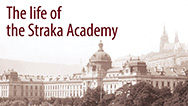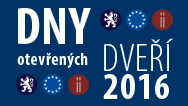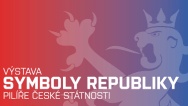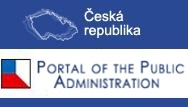Important personalities
19. 1. 2010
Ivan Medek (13. 7. 1925 - 6. 1. 2010)
Ivan Medek remained a moral authority which used to be in late 1970' and in 1980' when we were patiently waiting for his quiet, strong and unmistakeable voice which could be heard in regular radio programmes of the Voice of America.
It has been written all about Ivan Medek's astonishing family background in the obituaries; we cannot disregard it either. He was a grandchild of one of the greatest Czech painters, Antonín Slavíček, from the mother's side. His father was Rudolf Medek, a general of the Czechoslovak legions in Russia, writer and poet. In spite of the fact that political preferences tended to the right-wing parties, he associated friendly with artists of all the possible political beliefs, including poets and writers who professed to the communist left-wing. And those who did not take wiser to forget him after 1948, remembered Rudolf Medek with respect. Jaroslav Seifert, great Czech poet, writes in his Memories how he saw during his visits at Medek's family to play two general's sons on the carpet – Ivan and Mikuláš Medek. Mikuláš Medek became one of the best Czech painters after the World War Two. After his beginnings in the underground surrealistic group he changed to an original verse of the existential abstraction in the 1960´. As to the personalities who belong among the circle of the Medek's family we can mention cousin Herberta Masaryková – grandchild of Tomáš Garrigue Masaryk and sister-in-law Emila Medek – an outstanding photographer.
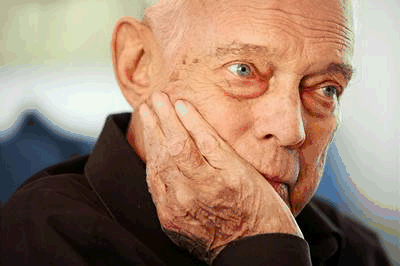 Photo Lidové noviny
Photo Lidové noviny
Ivan Medek was born on 13 July 1925 and he spent his childhood at the National Memorial on the Vítkov hill where his father acted as a director. After the World War Two he finished his studies at the Academic Grammar School and then he studied composition at the Prague Conservatory which he had to leave after the February coup. Music was a lifetime Medek's love; he acted as a music journalist, in the 1960´as an acting secretary and a dramaturge of the Czech Philharmonic Orchestra. He received his notice in 1970 when he put on the programme the Arthur Honegger's cantata Joan of Arc at the Stake on the anniversary of Jan Palach's burning. Then he worked for the music publishing house Supraphon and was dismissed in 1977 after he signed, as one of the first signatory, the Charter 77. Then a common story of people, who had not given the way to the totalitarian regime, followed: Ivan Medek worked as a dishwasher at a restaurant, a cloakroom attendant and an ambulance man; he had to endure continuous interrogation. As to his work for the Charter 77 we can mention the fact that he was one of authors of the document of Charta 77 on violation of freedom of worship in Czechoslovakia and the letter of fifty catholic worshippers to Cardinal Tomášek and to the President of the Czechoslovakia of October 1977. He was a member of the Committee for Three (a committee for the release of Václav Havel, Jaroslav Koukal and Pavel Landovský from the prison) and then he was a charter member of The Committee for the Defence of the Unjustly Persecuted. On 16 May 1978 he was at a Prague street attacked by members of the State Security who put him in a car with bandaged eyes and handcuffs on his hands and took him out of Prague where he was pull out and left in the midst of a forest. Shortly after that he accepted an invitation of the Austrian Chancellor Bruno Kreisky, he applied for an emigration passport, left Czechoslovakia and settled in Vienna.
Contemporaries remember his regular programmes of the Voice of America where he informed in particular about activities of political opponents of the regime and on repressions of the regime. In the exile he also cooperated with the catholic laic association Opus Bonum which had been founded by former Břevnov abbot and a communist prisoner Anatáz Opasek. The association helped the home dissent and worked for reconciliation between Germans and Czechs; after the Opasek's death Medek became its chairman.
After the revolution Ivan Medek returned to Prague and those who knew his unforgettable and strong voice from the foreign broadcasting could get to know also his face which had the same attributes. He became an advisor of the Czech Philharmonic Orchestra, an advisor of the Minister of Culture, the Chairman of the Federal Council for the Radio and Television Broadcasting. In 1993-1998 he worked for the Office of the President of the Republic Václav Havel as a director of the Section of Home Policy and then he became a Head of the Office. Since 1991 Ivan Medek had been a holder of the Order of T.G. Masaryk, in 1999 he was decorated with the Medal of Merit and he won the Prize of Ferdinand Peroutka for 2008. He wrote his memoirs "I am very well, thank you".
His illness has not allowed Ivan Medek to leave his flat in recent years but he has been still expressing his opinions on the situation in the society in newspaper interviews and on his audioblog. He often spoke and wrote about receding sense of values as bravery, politeness and truthfulness in our society and he draw out attention to the fact that not even the welfare society can be successful without restoration of these values.
